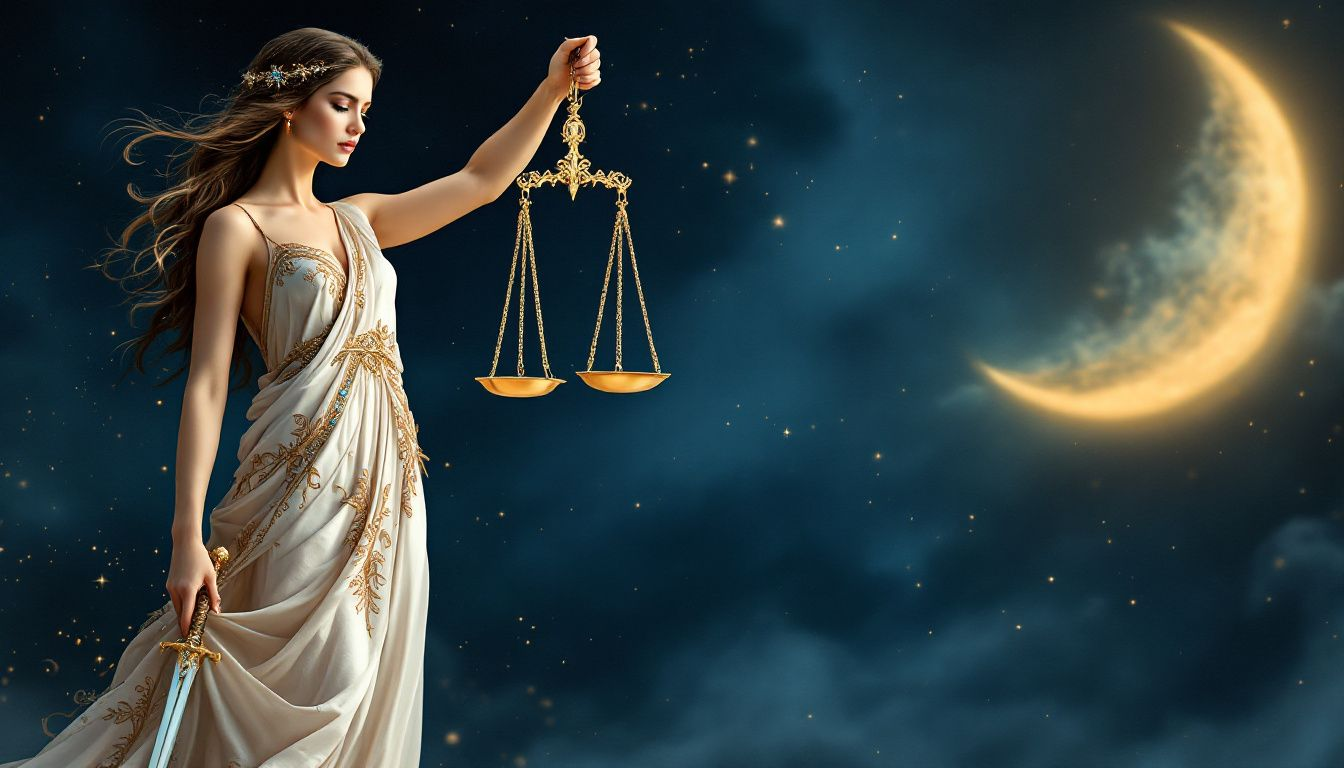Justice in Tarot: Meaning, Symbols, and Interpretations
Justice in tarot represents fairness, truth, and accountability. Justice asks individuals to reflect on their motivations, intentions, and the consequences of their actions, advocating for honesty and integrity in navigating their current situations. When it appears in a reading, it asks you to consider the consequences of your actions and strive for integrity. This article explores the symbolism, meanings, and interpretations of the Justice card, and its impact in different life contexts.
Introduction to the Justice Tarot Card
The Justice Tarot card is the 11th Major Arcana card in a tarot deck, and it is associated with the concept of morality, intention, truth, and integrity. This card is often depicted as a figure sitting between two pillars, symbolizing balance, law, and structure. The Justice card is a powerful symbol of fairness, accountability, and the consequences of one’s actions.
Key Takeaways
-
The Justice card in Tarot symbolizes themes of fairness, morality, and accountability, emphasizing the importance of truth and integrity in making a balanced decision.
-
Key symbols of the Justice card include scales representing balance, a sword symbolizing truth and decisive action, and two pillars illustrating the dual nature of justice and the necessity of multiple perspectives.
-
The Justice card’s interpretations vary depending on its position, with upright indicating fairness and karmic lessons, while reversed suggests avoidance of accountability and potential injustice.
The Justice Card in Tarot

The Justice card occupies the 11th spot within the Major Arcana, signifying its pivotal place in the voyage of Tarot. It accentuates moral considerations, purposeful actions, veracity, and uprightness when making choices. Connecting with one's higher self can aid in making moral and purposeful decisions. Its appearance during a reading points to an overarching notion of justice that is tempered by other cards nearby. It underscores finding equilibrium between fairness and truth.
Regarded typically as a favorable indicator promoting balance, this card delivers an emphatic call to recognize that true justice operates without partiality or subjectivity—insisting on confronting our actions’ outcomes with forthright sincerity and principled character.
Symbolism of the Justice Card

The Justice card is imbued with significant symbols that embody fairness and equilibrium. Justice sits between pillars, symbolizing balance and the careful consideration of decisions. The presence of scales signifies the essence of impartiality, while the sword epitomizes truth and the capacity for resolute action. Two pillars are depicted to highlight justice’s inherent duality and emphasize the importance of acknowledging diverse viewpoints.
Scales
The Justice card’s scales symbolize the equilibrium and impartiality crucial to rendering fair judgments. They serve as a visual cue about the necessity of evaluating evidence objectively and reaching decisions that are balanced, aligning with justice’s demands for truth-based rulings.
During a tarot reading, these scales implore us to seek harmony in our decisions and behaviors, encouraging an evenhanded approach.
Sword
The double-edged sword in the grasp of the figure representing Justice signifies a commitment to truth and moral clarity, as well as the necessity for decisive action. This symbol encapsulates justice’s capacity to yield both favorable consequences and stern repercussions, highlighting its intricate nature.
Two Pillars
The two pillars in the Justice card symbolize the dual nature of justice and the need to consider both sides of an argument. They represent the structure and stability of the legal system and the importance of viewing situations from multiple perspectives to achieve true fairness.
Meanings and Interpretations of the Justice Card

The Justice card represents themes of natural law, balance, and karma. It also signifies karmic retribution and the inevitability of accountability for one's actions. It encompasses truth, wisdom, legal matters, fairness, cause and effect, integrity, objectivity, perspective, and accountability. Keywords associated with the Justice card include justice, fairness, truth, cause and effect, and law. These themes highlight the card’s role in reminding us that our actions have consequences and that we must strive for integrity in all aspects of life.
The Justice card can indicate both positive and negative outcomes depending on its position in a reading. Upright, it signifies fairness and the importance of learning from past actions. Reversed, it indicates avoidance of accountability and potential dishonesty, urging self-reflection.
Upright Justice
In its upright position, the Justice card stands as a symbol of fairness, truthfulness, and adherence to the law. It represents an equilibrium in social standards and highlights that each decision and action from our past carries with it resultant consequences. The presence of this card serves as an indication that justice will ultimately be served, underlining the importance of reflecting on previous experiences for karmic lessons.
The emergence of the Justice card in its upright state prompts individuals to take deliberate steps while also cultivating a clear understanding rooted in both sound judgment and inner insight. This manifestation acts as a beacon for integrity-driven conduct by encouraging decisions marked by honesty and impartiality — cornerstones required to achieve true justice.
Reversed Justice
When the Justice card appears reversed, it frequently signifies a reluctance to take responsibility or acknowledge the repercussions of one’s behavior. This can point to unjust practices in professional environments and an inclination towards attributing errors to others that might provoke guilt and perpetuate issues left unaddressed. Those affected may experience a sense of unfair treatment, which stirs emotional distress alongside rigorous self-criticism.
In its inverted position, the Justice card implies that essential lessons are possibly being overlooked or evaded, potentially culminating in grave outcomes. It calls upon individuals to uphold equilibrium and accept accountability by emphasizing the significance of forthrightness and sincerity across varying circumstances.
Justice Card in Different Contexts

The Justice card signifies the importance of balance, integrity, and fairness across all life’s facets. It acts as a prompt that in legal affairs, personal responsibility or the teachings of karma, maintaining justice is crucial.
Legal Matters
The Justice card serves as an emblem of fairness and integrity within the realm of legal matters, representing a fair-handed approach to the legal process. It signifies an upstanding capacity for considering various viewpoints to deliver equitable judgment when positioned upright. This can suggest active participation in legal proceedings or anticipation of a verdict, underscoring the need to rectify wrongdoings through decisive conduct.
However, potential legal complications can arise, impeding the process of justice and making it difficult to achieve a fair resolution.
When depicted reversed, this card signals possible entanglements with legal issues and warns against unfair treatment that may arise professionally. Experiences tied to the Justice card concerning judicial matters vary widely from favorable resolutions to perceptions of inequity, accentuating its inherently multifaceted character regarding justice-related outcomes.
Personal Accountability
The Justice card underscores the significance of truth and fairness, accentuating the critical nature of aligning with one’s own principles. Feeling treated fairly is essential in maintaining personal accountability and integrity. It underlines the essential role that integrity and accountability play in daily choices. In a broad life context, drawing the Justice card spotlights the imperative for honesty as well as recognizing outcomes resulting from personal behavior.
When encountered, this card signals an urging towards truthfulness across different areas of existence to maintain equity. It prompts individuals to accept their duties while understanding that repercussions follow actions, frequently suggesting that finding middle ground is key to settling disputes.
Karmic Lessons
The Justice card signifies the principles of karma and the repercussions that one’s actions can have. It emphasizes the importance of understanding that every action prompts a fitting response, underscoring the notion of cause and effect. This card is a prompt, reinforcing how life’s teachings on equity and responsibility are frequently lessons we select for ourselves, mirroring karmic justice.
When revealed, the Justice card implies that acknowledging errors and gleaning wisdom from them fosters beneficial transformations in life. It conveys assurance that all endeavors will be brought into scrutiny eventually, resulting in consequences determined by earlier choices made.
Justice Card in Combination with Other Cards
Grasping the interplay between the Justice card and other cards from the Major Arcana can enhance one’s comprehension of equity, veracity, and repercussions within tarot interpretations.
When coupled with different entities like the High Priestess or The Emperor to The Hanged Man, each association delivers a distinct viewpoint regarding justice.
High Priestess
The combination of the High Priestess with Justice highlights the necessity to harmonize insightful intuition and objective truth, leading a person toward clear-cut ethical wisdom. It accentuates that intertwining one’s intuitive understanding with factual reasoning is crucial for attaining balance and fairness in making judgments.
The Emperor
When coupled with The Emperor, the Justice card underscores the imperative that authority be wielded with integrity and fairness. This combination stresses the significance of ethical leadership and organized governance in upholding justice and ensuring equitable treatment.
The Hanged Man
The pairing of Justice with The Hanged Man indicates a call to examine sacrifice from a new angle, prompting an evaluation of justice by considering various perspectives. This duo highlights the importance of contemplation and looking at things from different perspectives before finalizing any judgments, underscoring the need for equity and diverse viewpoints.
Practical Applications of the Justice Card

The principles encapsulated by the Justice card are pivotal, offering a representation of balance and fairness that is essential in numerous aspects of life. From resolving conflicts to making decisions or engaging in self-reflection, this card’s values can lead us toward outcomes that epitomize both balance and fairness.
Decision Making
The Justice card advises those faced with choices to weigh all aspects and strive for equilibrium. It uses the symbolism of the sword to emphasize the importance of making definitive decisions while being accountable for maintaining harmony in both personal connections and professional life.
When interpreting relationships, the Justice card points out that fair judgments should take into account past conduct as it will affect present results. The reminder from this card is to always make determinations in everyday life that embody fairness and balance.
Conflict Resolution
The essence of the Justice card is to guide people in dealing with disagreements by employing reason and equity. It advocates for a perspective that guarantees the recognition and consideration of every opinion during disputes. Creating an atmosphere where comprehension and even-handed discussions are paramount can turn contentious scenarios into chances for progress and reciprocal esteem, as suggested by the principles embodied in this card.
Advocating open conversations, the Justice card aids in fostering empathetic connections among those at odds. By pinpointing emotional undercurrents and convictions at play within conflicts, parties involved are able to work collaboratively towards outcomes that uphold fairness and equilibrium. This method addresses not only immediate disputes but also cultivates enduring harmony and lucidity.
Self-Reflection
The Justice card serves as a cue to ponder our previous actions, fostering self-improvement and responsibility. It compels us to look inward at former decisions and their bearing on current life scenarios with the aim of learning from these encounters and pursuing equilibrium across different aspects of life. Engagement with this archetype aids in identifying behavioral patterns that need redressal and ownership.
In matters pertaining to everyday existence, the card underscores the importance of embracing full accountability for one’s actions by weighing their repercussions carefully. Deliberation encouraged by the influence of the Justice card paves way for an enriched comprehension of one’s principles relating to equity and moral uprightness.
Accepting historical behaviors along with resultant outcomes is instrumental in achieving mental harmony and cultivating personal advancement.
Justice Card in Tarot Spreads
In different tarot card spreads, the Justice card offers distinct perspectives on various life facets such as career, relationships, or overall life scenarios. It underlines the significance of balance, fairness and accountability, which are integral to the meanings associated with the justice tarot card.
Career Spread
In the context of a career spread, when positioned upright, the Justice card embodies concepts of fairness, ethical conduct, and truthfulness. It suggests that in matters related to one’s profession, justice will triumph. The card underscores the importance of accepting responsibility for one’s actions and maintaining moral uprightness in business transactions. Utilizing this tarot symbol as part of decision-making endeavors can assist in achieving decisions that are equitable and justly balanced.
The Justice card acts as an impetus for self-examination by encouraging individuals to evaluate their own level of honesty and adherence to ethical norms. This kind of personal audit can enhance professional interactions and boost contentment within one’s vocational path by ensuring it is congruent with their core values and ethics.
Relationship Spread
In readings concerning relationships, the Justice card typically symbolizes the essential nature of fairness and underscores the imperative for reciprocal esteem among partners. It implies that in romantic unions, maintaining an equitable balance through fair actions and accountable decision-making is vital to preserving relational harmony.
When positioned upright, this card often conveys that an individual who embodies integrity will likely draw a suitable companion into their life, thereby achieving equilibrium within their interpersonal bonds. It advocates for open and truthful dialogue between partners while taking heed of one another’s viewpoints to guarantee that their connection thrives on a foundation of collective regard and evenhandedness.
General Life Spread
The Justice card embodies the essential themes of balance and fairness, which are pivotal for a life lived in harmony. When this card surfaces during readings, it encourages individuals to scrutinize whether their behaviors and choices reflect an equitable stance. It underscores that achieving justice requires a blend of impartial judgment along with a subjective grasp of each circumstance.
Striking equilibrium within one’s own life entails measuring intentions against the actual ramifications of personal actions. The Justice card stresses the need for individual accountability and uprightness across every aspect of existence. Decisions made with candor and lucidity foster adherence to the core tenets embodied by the Justice card, ensuring fair practices.
In essence, the presence of this tarot figure casts light on forging a path marked by balanced living. It advocates adopting measures steeped in just treatment throughout all forms of interaction.
Summary
The Justice card in Tarot is a powerful symbol of fairness, balance, and accountability. Whether dealing with legal matters, personal decisions, or karmic lessons, the Justice card reminds us that our actions have consequences and that integrity is paramount. By embracing the principles of the Justice card, we can navigate life’s challenges with wisdom and equity, ensuring that our decisions reflect the values of truth and fairness.
Conclusion
In conclusion, the Justice Tarot card is a complex and multifaceted symbol that represents the universal moral code and the importance of accountability and fairness. It asks individuals to examine their thoughts, intentions, and actions, and to take responsibility for their choices. The Justice card is a reminder that every action has consequences, and that the path to true justice and balance lies in honesty, integrity, and a commitment to doing what is right. By embracing the principles of the Justice card, individuals can cultivate a deeper sense of morality and integrity, and live a more authentic and meaningful life.
Frequently Asked Questions
What does the Justice card represent in Tarot?
The Tarot’s Justice card represents balance, truth, and fairness, emphasizing the importance of integrity and the consequences that result from our actions. It acts as a prompt to remember the essential nature of accountability in all affairs.
How does the Justice card influence legal matters?
In the realm of legal affairs, the Justice card stands as a symbol of integrity and fairness, underscoring the need for equitable resolutions and rectifying any wrongdoings.
This card’s appearance typically signals engagement in judicial processes where meticulous attention to truth and equilibrium is necessary.
What is the significance of the scales in the Justice card?
The scales on the Justice card signify balance and impartiality, emphasizing the importance of fair decision-making based on truth and careful consideration of evidence.
This symbolism serves as a reminder to uphold justice in all aspects of life.
What does the reversed Justice card indicate?
The reversed Justice card indicates a tendency to avoid accountability and may suggest dishonesty or unfair treatment. It highlights the importance of self-reflection and the need for greater transparency.
How can the Justice card be applied in everyday life?
The Justice card can effectively guide your decision-making and conflict resolution by emphasizing fairness and accountability in your actions. By applying its principles of integrity, you can foster a more balanced and just environment in your everyday life.







